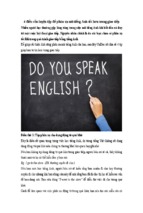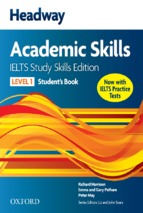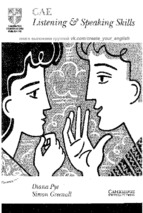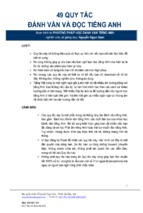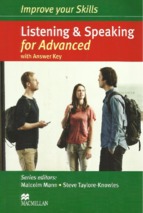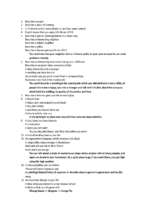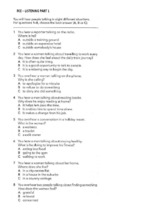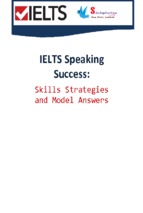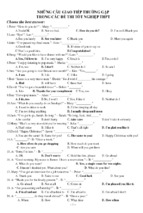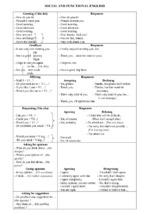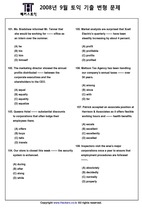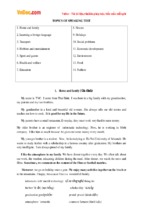Scan and OCR by maillo
LIVING LANGUAGE
FLUENT
English
Written by
Barbara Raifsnider
Edited by
Christopher A. Warnasch
Scan and OCR by maillo
Contents
Introduction
LESSON 3
WHAT WOULD YOU LIKE TO DO? 21
LESSON 1
HOW LONG HAVE YOU BEEN HERE? 1
1A
Say It Clearly!: Pronunciation of-ed Ending
1
1C
English At Work: Dialogue – Making
SmallTalk 1
Build Your Vocabulary 2
1D
English Under the Hood:
1B
3A
Say It Clearly!: Reductions 21
3B
English At Work: Dialogue -Would You
Mind if I Looked at Your Resume? 21
3C
Build Your Vocabulary 22
3D
English Under the Hood:
1. Questions and Negatives in the Simple
Past Tense 24
2. The Past Habitual: Used to, Didn't Use
to, and Would Always 24
1.The Present Perfect Tense vs. The
Simple Past Tense 3
3. Making Polite Requests 26
3E
Phrasal Verbs with work 27
3F
3.Using/or and since with the Present
Perfect and Simple Past Tenses 5
Real English: Put Your Nose to the
Grindstone 28
3G
Bring it All Together 28
1E
Phrasal Verbs with pick 6
3H
Listen Up! 30
1F
Real English: See You Later! 6
3I
Why Do They Do That? Shaking
Hands 30
2.Verbs with Irregular Forms in the Past
and Present Perfect Tenses 4
1G
Bring it All Together 7
1H
Listen Up! 9
1I
Why Do They Do That? Greetings and
SmallTalk 9
LESSON 4
LAUGHING ALL THE WAY TO THE
BANK 32
LESSON 2
4A
Say It Clearly!: Y-Vowel Link 32
DON'T GO AWAYI 11
4B
English At Work: Reading - Banks in the
U.S. 32
4C
Build Your Vocabulary 33
2A
Say It Clearly!:-s Endings 11
2B
English At Work: Recorded Message— The
Hotel Royale 11
4D
English Under the Hood:
2C
Build Your Vocabulary 11
1. Simple Future vs. Immediate Future 34
2D
English Under the Hood:
2. The Present Continuous and Simple
Present to Express the Future 35
1. -s Endings in the Third Person
Singular 14
3. The Simple Present Tense with
Prepositions of Time 35
2. The Negative Simple Present Tense 14
3. Questions in the Present Tense 15
4E
Phrasal Verbs with pay 36
Phrasal Verbs with turn 16
4F
Real English: In the Black 36
Real English: Hold On! 17
4G
Bring it All Together 37
Bring it All Together 17
4H
Listen Up! 39
2H
Listen Up! 19
4I
Why Do They Do That? Debt 39
2I
Why Do They Do That? Americans on the
Move 19
2E
2F
2G
LESSON 5
2. Degrees of Certainty in the Past
Tense 64
THE CUSTOMER'S ALWAYS RIGHT! 41
5A
Say It Clearly!: W-Vowel Link 41
3. Degrees of Certainty in the Future
Tense 65
5B
English At Work: Dialogue - Did You
Need Some Help? 4
Phrasal Verbs for Giving and Getting 66
5C
Build Your Vocabulary 42
5D
English Under the Hood:
1. Prepositions of Time, Motion, and
Location 43
Real English: Keeping in Touch with
Friendly Advice 67 Bring it All
7G
Together 68 Listen Up! 70
7H
Why Do They Do That? Benjamin Franklin
and the American Work Ethic 70
2. Adjectives Followed by
Prepositions 44
LESSON 8
3. Verbs Followed by Prepositions 45
5E
Phrasal Verbs for Shopping 46
5F
Real English: Shop Till You Drop! 47
5G
Bring it All Together 47
YOUR RIGHTS AND
RESPONSIBILITIES
72
8A
Say It Clearly!: Consonant-Consonant
Linking 2 72
5H
Listen Up! 49
8B
5I
Why Do They Do That? Service with a
Smile 50
English At Work: Dialogue - Do You Know
Why I Pulled You Over? 72
8C
Build Your Vocabulary 73
8D
English Under the Hood:
1. The Passive Voice in the Simple Present
and Present Continuous Tenses 75
LESSON 6
I HAVE GOT TO HAVE A NEW CAR! 51
6A
Say It Clearly!: Consonant-Vowel Link 51
2.The Passive Voice in the Present Perfect
and Simple Past Tenses 75
6B
English At Work: Dialogue - Let's Go
Look at My New Car. 51
3.The Passive Voice in the Simple Future
and Immediate Future Tenses 76
6C
Build Your Vocabulary 52
6D
English Under the Hood:
8F
1. Modals of Necessity 53
8G
Bring it All Together 78
2. Modals of Advisability 54
8H
Listen Up! 80
3. Negative Modals 54
8I
Why Do They Do That? Some Important
Driver's Responsibilities 80
6E
Phrasal Verbs with come 55
6F
Real English: I Need Some
New iWheels! 57
6G
Bring it All Together 57
6H
Listen Up! 59
6I
Why Do They Do That? Americans and
Their Cars 59
Phrasal Verbs for Criminal Acts 76
Real English: You're Busted! 77
LESSON 9
THIS IS PARADISE, ISN'T IT? 8
9A
Say It Clearly!: Intonation in Tag
Questions 82
9B
English At Work: Reading - Aloha from
Hawaii! 82
LESSON 7
9C
Build Your Vocabulary 83
PUSHING THE ENVELOPE 61
9D
English Under the Hood:
7A
Say It Clearly!: Consonant-Consonant
Linking 61
1. Tag Questions 84
7B
English At Work: Reading - A Brief
History of Mail Delivery in the U.S.A. 61
3. Beginning Sentences with Negative
Adverbs 86
2. Negative Questions 86
7C
Build Your Vocabulary 62
9E
Phrasal Verbs with look 87
7D
English Under the Hood:
9F
Real English: Your Island Getaway 88
1. Degrees of Certainty in the Present
Tense 63
9 G Bring it All Together 88
LESSON 12
9 H Listen Up! 90
SHE'LL WIN BY A LANDSLIDE! 114
9 I Why Do They Do That? Travel in
America 91
12 A Say It Clearly!: Consonant Clusters 114
12 B English At Work: Reading-America Divided,
But Always United 114
12 C Build Your Vocabulary 115
LESSON 10
TAKE ME OUT TO THE BALL GAME! 92
12 D English Under the Hood:
1. The Progressive Form of Modals 116
10 A Say It Clearly!: Intonation in Questions in
Statement Form 92
10 B English At Work: Dialogue-It's a Great
Day for Baseball! 92
10 C Build Your Vocabulary 93
2. The Use of would rather 117
3. Past Ability 118
12 E Phrasal Verbs for Winning and Losing
118
12 F Real English: Does She Have What it
Takes? 119
10 D English Under the Hood:
1. Reported Speech: Past, Present, and
Future 94
2. Using Modals in Reported Speech 95
3. Questions in Statement Form 96
12 G Bring it All Together 119
12 H Listen Up! 122
12 I
Why Do They Do That? Religion in the
U.S. 122
10 E Phrasal Verbs with keep 97
10 F Real English: A Day at the Races 97
10 G Bring it All Together 98
LESSON 13
10 H Listen Up! 100
PRIDE OF OWNERSHIP
10 I
124
13 A Say It Clearly!: Reductions with should,
could, and would 124
Why Do They Do That? The Super
Bowl 100
13 B English At Work: Dialogue — Who Needs
Buyer's Remorse? 124
13 C Build Your Vocabulary 125
LESSON 11
SNAIL MAIL JUST WON'T CUT IT!
103
13 D English Under the Hood:
1.Past Forms of should and shouldn't 126
11 A Say It Clearly!: The Vowels in seat and
sit 103
11 B English At Work: Reading — A Brief
History of the Internet 103
11 C Build Your Vocabulary 104
11 D English Under the Hood:
1. The Present Perfect Tense vs. The
Present Perfect Progressive Tense 105
2. The Present Perfect Progressive
Tense vs. The Past Perfect
Progressive Tense 107
3. The Future Progressive Tense 107
11 E Phrasal Verbs for the Computer 108
11 F Real English: Life Online 109
2.Be supposed to and be to 127
3.Making Suggestions with could 127
13 E Phrasal Verbs for Buying and Selling a
House 128
13 F Real English: Real Estate 129
13 G Bring it All Together 129
13 H Listen Up! 131
13 I
Why Do They Do That? The American
Dream of Home Ownership 132
LESSON 14
HIT THE BOOKS!
134
11 G Bring it All Together no
14 A Say It Clearly!: The Preposition to 134
11 H Listen Up! 112
14 B English At Work: Dialogue - He's Always
Been a Good Student! 134
11 I
Why Do They Do That? The Internet
Generation 112
14 C Build Your Vocabulary 135
14 D English Under the Hood:
1. Verbs Followed by Infinitives 137
2. Adjectives Followed by Infinitives and
It Plus Infinitive 138
16 G Bring it All Together 162
3. Verbs Followed by Nouns or Pronouns
Plus Infinitives 139
16 I
16 H Listen Up! 164
Why Do They Do That?
Watercooler
Conversations 165
14 E Phrasal Verbs for School 140
14 F Real English: Life on Campus 140
14 G Bring it All Together 141
LESSON 17
14 H Listen Up! 143
14 I
Why Do They Do That? American
Teachers 143
LESSON 15
LET'S GET TOGETHER SOMETIME!
145
THIS DIET MAY WORK FOR YOU! 166
17 A Say It Clearly!: Consonant Clusters with /
and r 166
17 B English At Work: Dialogue — What are
You Going to Get? 166
17 C Build Your Vocabulary 167
17 D English Under the Hood:
15 A I Say It Clearly!:The Vowels in pull and
pool 145
1. The Real Conditional in the Present
and Future 168
15 B English At Work: Dialogue — Who's That
2. The Unreal Conditional in the Present
and Future 169
Over There? 145
15 C Build Your Vocabulary 147
15 D English Under the Hood:
3. The Past Unreal Conditional 170
17 E Phrasal Verbs about Food 170
1. Verbs Followed by Gerunds 149
17 F Real English: This is Your Cup of Tea
2. Verbs Followed by Prepositions and
Gerunds 149
171
3. Go plus Gerunds 150
17 H Listen Up! 174
15 E Phrasal Verbs about Relationships 151
17 G Bring it All Together 172
17I
15 F Real English: She's a Real Knockout! 152
Why Do They Do That? Food
Manners 174
15 G Bring it All Together 152
15 H Listen Up! 154
LESSON 18
15 I Why Do They Do That? Drop by
Anytime! 154
LESSON 16
WATERCOOLER CONVERSATIONS
156
GET INTO SHAPE! 177
18 A Say It Clearly!: Linking Reductions with d,
t, s, or z 177
18 B English At Work: Dialogue-Let Us
Design a Fitness Program for You! 177
18 C Build Your Vocabulary 178 18 D English
Under the Hood:
16 A Say It Clearly!: The Vowel Sound in
man 156
1. Implied Conditionals 199
2. Using wish in Conditionals 180
16 B i English At Work: Dialogue - What Do
You Think About the New Boss? 156
3. Using would to Make Wishes 181
16 C Build Your Vocabulary 157
18 E Phrasal Verbs for Health and Fitness 182
16 D English Under the Hood:
18 F Real English: You're the Picture of
Health! 183
1. Passive and Past Forms of
Infinitives and Gerunds 158
2. Passive Infinitives and Gerunds
after need 160
3. Using Possessives to Modify
Gerunds 160
16 E Phrasal Verbs with take 161
16 F Real English: I Really Work My Tail
Off! 162
18 G Bring it All Together 183
18 H Listen Up! 185
18 I
Why Do They Do That? The Fitness
Craze 186
LESSON 19
2.Verbs of Perception 202
911, EMERGENCY! 188
3.Reflexive Pronouns 203
19 A
Say It Clearly!: Dropping Syllables 188
20 E Phrasal Verbs with get 204
19 B
English At Work: Dialogue - Isn't This an
Emergency? 188
20 F Real English: Shooting the Breeze 205
19 C
Build Your Vocabulary 189
20 H Listen Up! 208
19 D
English Under the Hood:
20 I Why Do They Do That? Body Language,
Personal Space, and More 208
1.Indirect Objects as Passive
Subjects 191
2.The Stative Passive 191
3.Common Uses of Get 192
19 E
Phrasal Verbs Related to
20 G Bring it All Together 205
APPENDIX A
IRREGULAR VERBS 211
Emergencies 193
19 F
Real English: Keep Your Cool! 194
19 G Bring it All Together 194
19 H
Listen Up! 196
19 I
Why Do They Do That? HMO's vs. the
Family Doctor 197
APPENDIX B
ADJECTIVES FOLLOWED BY
PREPOSITIONS 213
APPENDIX C
LESSON 20
VERBS FOLLOWED BY
PREPOSITIONS 214
JUST SHOOTING THE BREEZE 199
20 A
Say It Clearly!: English Intonation 199
20 B
English At Work: Dialogue - A Block Party
199
20 C
Build Your Vocabulary 200
20 D
English Under the Hood:
1. Participial Adjectives 201
APPENDIX D
REAL ENGLISH IDIOMS 215
INDEX
221
INTRODUCTION
Fluent English is a high intermediate-/advanced-level course in English as a second or
foreign language. It is designed to meet the needs of the intermediate-level student in
vocabulary, grammar, listening comprehension, idiomatic usage, and pronunciation. It
offers a great deal of practice in each of these areas, through both written exercises and
recorded materials. The language used in this course is realistic and practical, and the
situations in each of its twenty lessons offer a cultural context that will be recognizable
and relevant to most intermediate-level students of English.
The course is divided into twenty lessons covering a range of topics from small talk and
social situations, to telephones and business meetings, to computers, politics, and the
Internet. Each lesson offers essential vocabulary related to its topic, as well as important
phrasal verbs and idiomatic expressions that are typically challenging to the intermediatelevel student. The lessons are divided into ten sections, each of which focuses on a
different English language skill:
• Say It Clearly! The first section of each lesson is a recorded pronunciation and
intonation warm-up. These sections focus on aspects of pronunciation and
intonation that are typically challenging for intermediate students of English —
consonant clusters, linking, reduced English, challenging sounds, etc.
• English at Work. The second section of each lesson features English in realistic
contexts, ranging from dialogues to recorded messages to readings. The English
at Work section is the cornerstone of each lesson, where the important
grammatical structures and vocabulary are demonstrated. These sections are all
recorded, giving the student an opportunity to hear and model native speakers.
• Build Your Vocabulary. The vocabulary section of each lesson includes
certain vocabulary from the English at Work section as well as other general
vocabulary related to the topic of the lesson. Each word or expression is
defined in simple English, and an example is given to show realistic usage.
• English Under the Hood. Each lesson focuses on three important grammatical
structures. Explanations are complete and straightforward, and plenty of examples
are given to demonstrate each construction in context. Each grammatical point is
also followed by a practice drill, giving the student a chance to practice and check
comprehension.
• Phrasal Verbs. Each lesson includes a list of important and common phrasal verbs
centered either on a common base verb, such as take or get, or a particular theme.
Each phrasal verb is clearly defined, and examples of usage follow each definition.
• Real English. Important idiomatic expressions related to the topic or theme of
each lesson are included in the Real English section. This section is in the form
of a short paragraph, where idiomatic expressions are used in context. The
student should be able to understand the meaning of each expression from
context, but each idiom is also defined in an appendix at the back of the book.
• Bring it All Together. Each lesson also includes five comprehensive review
exercises. The first exercise focuses on the vocabulary from the lesson, the next
three focus on
the grammar and structure, and the last one focuses on the phrasal verbs introduced in
that lesson.
• Listen Up! Each lesson includes a recorded listening comprehension exercise. The
student is directed to listen to a short article or dialogue on a topic related to the lesson,
and then to answer questions written in the book. The Listen Up sections are designed
to use both vocabulary and idiomatic expressions related to the theme of the lesson.
• Why Do They Do That? Each lesson includes a culture note that explains an aspect of
American culture related to the lesson's topic. These aspects of culture range from table
manners to home ownership to driving habits to proper behavior while being pulled over
for speeding. The culture notes are designed to be both interesting and relevant to the
student's experiences.
• Answer Key. Each lesson also includes a key to all exercises.
KEY TO SYMBOLS
When you see
PLAY CD and listen to the examples or exercises on the audio
portion of the course.
When you see
PAUSE CD and return to the book until you seethe next
Le
esso
on 1
How Longg Have You
u Been Herre?
AR
RE YOU READY
Y FOR THE LES
SSON?
Lessson 1, How Lon
ng Have You Be
een Here?, will ta
ake you somew
where you may know very
we
ell: the INS office
e. You'll listen in
n on a conversa
ation between tw
wo people waitin
ng in line,
which is something
g people unfortu
unately do very often, and whic
ch is also a situa
ation in
which Americans like
l
to make "sm
mall talk."Then, you'll learn som
me vocabulary th
hat will come
in handy
h
at the INS
S or anywhere you
y have to fill out
o forms. But th
hat's not all. Lessson 1 also
inccludes:
• The
e Present Perfec
ct Tense vs. The
e Simple Past Te
ense
• Using/or and sinc
ce with the Prese
ent Perfect and
d
Sim
mple Past Tens
ses
• Phrasal Verbs with
h pick
• Idio
omatic Express
sions for Saying
g Goodbye
Fin
nally, at the end of the lesson you'll read a culture note about casual
c
greetings and
acq
quaintances. Bu
ut let's start with
h a pronunciation warm-up. Rea
ady?
1A SA
AY IT CLEAR
RLY!
Turn on your CD to
t review the pro
onunciation of-e
ed, a very imporrtant ending in
En
nglish.
1B EN
NGLISH AT WORK
W
Dia
alogue: Making
g Small Talk
Sergei, a Russian immigrant, is waiting
w
in line att the INS. The line is very long, and it's
mo
oving very slowly. Peter, an Am
merican standin
ng in front of Se
ergei, turns aro
ound and
striikes up a conve
ersation. Sergei is surprised by his friendliness
s.
Peter
Peter
Sergei
Peter
Sergei
Peter
Sergei
I guess we didn't have
e anything else
e to do today, did
d we?
Sergei What?
I said I guess
g
they thin
nk that we didn
n't have anythiing else to do today.
t
It's
just tha
at we've been in
n this line for a very long time. lt seems like
e we
aren't going
g
anywhere
e very fast.
Yeah. I know. I've been here since about 9:30. Wha
at about you?
I think I got here just a few minutes before you did
d. I decided to pick
p
up a
green-c
card application
n for my wife. I should've gottten it off the In
nternet.
That wa
ay I could have
e just stayed ho
ome. Say, where are you from
m?
Me? I'm
m from Russia.
Oh, whe
ereabouts?
I lived in
n Moscow for most
m
of my life
e, but I moved around a little.. I was in
the military.
2 FLUENT ENGLIS
SH
Peter
Sergei
Peter
Sergei
Peter
Sergei
Clerk
Peter
Sergei
Intteresting. I've never
n
been to R
Russia, but I've
e always wante
ed to visit.
It seems
s
like suc
ch an interestin
ng country. How long have yo
ou lived
he
ere?
I'v
ve lived in San Diego for only a few weeks, but
b I've been in
n the U.S.
sin
nce August.
We
ell, welcome to
o San Diego. I g
guess the weather must be a bit
wa
armer than whe
ere you're from
m, huh?
Ye
es, that's true. I've gotten use
ed to it.
Ha
ave you visited
d the zoo or Ba
alboa Park yet?
?
No
o, but I really want
w
to go to Ba
alboa Park. I've
e heard about all the
flo
owers and mus
seums that are there.
ne
ext!
He
ey. That's me. Gotta
G
go. See y
you around.
Oh
h. OK. See you
u.
1C BUILD
B
YOUR
R VOCABUL
LARY
Perhaps you need
n
to go to the
e I. N. S. to fill o
out some forms. Here are some
e terms you
would see if yo
ou were to fill ou
ut an application
n to register for permanent resid
dence.
Many of these words have oth
her meanings, b
but these are the
e usages you will
w see on I.
N. S. forms and other legal do
ocuments.
To be cited. To
T be summoned to appear in ccourt. The police
e could cite you
u for littering
if you throw tra
ash out of your car.
c
To be indicted
d. To be charge
ed with a crime. Richard Haywa
ard was indicted
d for
espionage whe
en he was caug
ght selling U.S. d
documents to a foreign governm
ment.
Ordinance. A law or regulatio
on, usually passsed by a local go
overnment. The
e city
council passed
d an ordinance permitting
p
the u
use of marijuana
a by cancer patients.
Beneficiary. A person who is or will be the re
ecipient of some
ething of value from
f
someone who has died. Harolld and Gerry we
ere the sole ben
neficiaries of the
eir mother's
modest estate..
Rehabilitation
n. Treatment to help someone rreturn to regular, acceptable, or
o normal
behavior or abilities. Recoveryy from drug abu
use or physical injuries. It was difficult
d
to
convince the governor
g
that Sa
am had been su
uccessfully rehabilitated and wa
as ready to
leave jail and return
r
to societyy.
Clemency. A lesser
l
penalty th
han what a court originally sugg
gested. Thinking that
Ralph Smith ha
ad suffered eno
ough for the crim
me he committed, the judge gra
anted him
clemency and gave him a sho
orter prison senttence.
Amnesty. A pa
ardon given to a large group off individuals. Th
he government
granted amnes
sty to all illegal immigrants
i
who
o had come to work
w
in the fieldss.
Procure. To obtain, to buy, to
o take possessio
on of something
g of value. Profe
essor
Hodges wante
ed to procure some ancient artiffacts before retu
urning from his sabbatical
s
in Africa.
To engage in.. To become invvolved in something, to do something. Teresa would
never engage in illegal activitiies, even if she disagreed with a law.
To induce. To
o influence some
eone to do something. Robbie's
s older brother induced
i
him to steal mo
oney from their parents.
Lesson 1: How Long Have You Been Here?
3
To conspire. To plan together in secret to do harm. Kathy and Jane conspired to make
Mary look foolish.
To solicit. To ask for something of value, usually money. Raymond got a job soliciting
money for his political party.
To sabotage. To destroy or cause to fail. The lab technician sabotaged the experiment
by deliberately mixing up the samples.
Espionage. Spying. Espionage was a common practice during the Cold War, and it still
is today.
Affiliated. To be in close connection. The local television stations are all affiliated with
major networks.
To persecute. To harass, to cause someone to suffer because of a belief. Many people
have come to the United States because they were persecuted in their countries.
To incite. To move to action, to cause. The Prime Minister's latest announcement incited the
protesting crowd to become violent.
Fraud. A false claim, trick; a liar or imposter. Sam Jameson created a false medical
license and began practicing medicine until he was exposed as a fraud.
Waiver. A document that gives up a right or grants unusual permission to someone
else. Juan signed a waiver giving his doctor the right to send his medical records to his
insurance company.
Custody. Having legal guardianship of a child or children, often part of a divorce
settlement. When the Camerons divorced, Mrs. Cameron received custody of both
children, and her husband won weekend visitation rights.
1D ENGLISH UNDER THE HOOD
TOPIC 1: The Present Perfect Tense vs. the Simple Past Tense
Let's take a look at the two most common past tenses in English: the present perfect tense
and the simple past tense.
Present Perfect
/ have spoken
Simple Past
I spoke
you have spoken
you spoke
he, she, it has spoken
he, she, it spoke
we have spoken
we spoke
they have spoken
they spoke
As you can see, the present perfect tense is formed with the verb to have and the past
participle of the main verb, in this case, spoken. The simple past tense is just the past form of
the verb, which in this case is spoke. These tenses are used a bit differently. The present
perfect tense expresses an event that happened in the past when the exact time is not
known, or when there's a result or a connection being made to the present, or when the time
reference is still unfinished, as in so far this week, or up to now, or during my entire life.The
simple past tense, on the other hand, expresses an action that happened when a specific
finished time is given, such as yesterday or last
4
FLUENT ENGLISH
week or in 1995. Sometimes these tenses are interchangeable, depending on what the speaker
wishes to emphasize. Here are a few examples.
Julia has returned from her trip. (No specific time is given or is important, and the speaker is
emphasizing that Julia is now home.)
Julia returned from her trip. (Perhaps this is part of a longer narration of events in the past.)
I finished reading the novel last night. ("Last night" indicates a specific time in the past.)
Has Pam ever been to New York? ("Ever" means "during her entire life.")
/ worked five days last week. ("Last week" is finished time.)
So far this week I've worked three days. ("This week" is unfinished time.)
PRACTICE EXERCISE 1: Complete each of the following sentences with either the present
perfect or simple past tense.
1. _________________ (drive) Mary
her new car to Santa Barbara yesterday.
2. __________________ (not try) Sam on his new pants yet.
3. _______________ (buy) We a new house last week.
4. __________ (eat) ________ you ever fried bananas?
5. _____________________________ (not go) Mr. and Mrs. Denton out of town last weekend.
6. ____________ (see) I _____ never
The Birds.
7. ____________________ (not speak) He
much English during his trip last April.
8. _____________ (miss) ______you
me while I was gone?
9. ____________ (dance) you ever the salsa?
10. ________________ (get) Richard
a new car last week.
TOPIC 2: Verbs with Irregular Forms in the Past and Present Perfect Tenses
A lot of common verbs have irregular simple past and past participial forms. Here are some of the
more common ones. You'll also find a list of all of the most important irregular verbs in the
appendix on page 211.
Present
be
begin
Past
was/were
began
Past Participle
been
begun
bring
do
eat
brought
did
ate
brought
done
eaten
go
went
gone
have
know
had
knew
had
known
see
saw
seen
sing
speak
sang
spoke
sung
spoken
Lesson 1: How Long Have You Been Here?
take
write
took
wrote
5
taken
written
PRACTICE EXERCISE 2: Complete each of the following sentences.
1. (sing) Who ______ that last song?
2. (do) Sarah _____ her homework last night.
3. (be) Where ______ you at breakfast?
4. (begin) Madeline ______ already __________ her new job.
5. (know) Henry _______ all of the answers.
6. (write) _______ you _________ that letter yet?
7. (begin) Angel ______ his university education last spring.
8. (sing) She _____ in Las Vegas many times.
9. (see) ______ anyone really ever _________ Big Foot?
10. (take) I had a headache, so I ______ some aspirin.
TOPIC 3: Using for and since with the Present Perfect and Simple Past Tenses
Use since when a specific point in time is given. Use/or when a period of time, rather
than a specific point in time, is given.
Since...
yesterday
For...
one day
last week
last month
a week
three months
Richard has lived in Chicago since 1985.
Richard has lived in Chicago for twenty years.
Notice that you can use for and since with either the simple past tense or the present perfect
tense, depending on whether or not the action is still happening.
I've worked for Green Enterprises for three years. (I still work there.)
/ worked for Green Enterprises for three years. (Now I work somewhere else.)
PRACTICE EXERCISE 3: Complete each sentence with either since or for.
1. We've lived in Los Angeles _________ before Barry was born.
2. We've lived in Los Angeles _________ ten years.
3. There's been a roadblock on the freeway __________ three days.
4. I haven't seen you _________ I was in high school.
5. Why haven't you called __________ two weeks?
6. Susan hasn't gone to work __________ last Tuesday.
7. They stayed at this hotel __________ three nights.
8. Roger and Martin have been gone __________ hours!
9. Have you been waiting for me __________ 7:30?
10. She hasn't spoken to me ___________ the night we got into an argument.
6 FLUENT ENGLISH
1E PHRASAL VERBS WITH PICK
Pick up.
a) To take something up off of a surface. Pick your coat up off the floor.
b) To meet and collect a person from a specific location. Who's going to pick Henry up at
the airport?
c) To buy something Jordan picked up some milk on the way home.
*Note that to pick up a person can also mean to meet someone, usually at a public place such as a bar or
night club, and to become sexually involved with him or her after spending only a short time together.
Pick out.
a) To select, to choose. Melissa picked out a shirt and brought it to the dressing room.
b) To separate from. If you break a wine glass, make sure you pick all of the glass out of the
carpet.
Pick over.
To take the best of something and leave what is not so good. The shirts have been on
sale so long that they've really been picked over.
Pick on.
To tease. My sisters and brothers always picked on me because I was the youngest.
Pick from.
To choose from a group of something. Mrs. Stefanson picked a new assistant from the
group of applicants for the job.
Pick at.
a) To take only very small amounts of food. Jessica ate almost everything on her plate, but
she only picked at her peas.
b) To scratch or irritate something, such as a cut or scrape. Don't pick at that cut! Let it heal.
Pick up on.
To understand something, especially something that isn't intended to be understood.
They spoke in Spanish in front of Dorothy, so she didn't pick up on what they were
talking about.
*Note that pick up, pick out, pick from, and pick over are separable. This means the two words can be
separated and a pronoun or noun can be inserted between them. Billy picked out the raisins or Billy picked
them/the raisins out, but not Billy picked out them. Pick on, pick at, and pick up on are not separable. You
cannot separate the verbs from the prepositions.
1F REAL ENGLISH
SEE YOU LATER!
Saying "good-bye!" is only one way to end a conversation. There are a lot of idiomatic
expressions that people use when a conversation is over or when they have to leave.
Here are some important ones, listed from most to least formal: Have a good day. Take
care. Take it easy. (I'll) See you later. (I'll) See you around. See ya! Catch you later. Gotta go.
Note that these expressions are often preceded with Well. Well, have a nice day!
Lesson 1: How Long Have You Been Here?
7
1G BRING IT ALL TOGETHER
Now let's review everything we've covered in this lesson.
REVIEW EXERCISE 1: Vocabulary
Place the correct vocabulary word in each space. Use each of the following words
once: solicit, beneficiary, indicted, procured, waiver, persecuted, incited, affiliation,
espionage, amnesty, conspired, rehabilitation, clemency, sabotage, cited, induce,
fraud, custody, ordinance, engaging.
1.
When we found out that Dr. Wells hadn't gone to medical school, we knew he was a
________.
2.
Learning new skills is essential to the successful ________ from a life of crime.
3.
For some people, working is much harder than ________ in crime.
4.
The well-known
International is an organization dedicated to encouraging
governments to free their political prisoners.
5.
Bill Jackson feltbecause he had received a dishonorable discharge from the army and
few employers would hire him.
6.
The soldiers sneaked in behind enemy lines to ______ the next shipment of weapons.
7.
______ by jealousy, Roberto accused his wife of having an affair.
8.
If you let your dog walk around without a leash, you are violating a city.
9.
I want to show you some new gems we've recently .
10. The senator was forced to resign when his with a racist organization was uncovered.
11. A sixteen-year-old cannot attend adult school without a
from high school.
12. Tammy went to several companies to ______ money so that she could afford to travel
to the swimming competition.
13. Ralph was ______ for breaking and entering.
14. Mary was ______ for driving with her lights off.
15. The Rangels filed for ______ of their daughter's son.
16. A governor has the power to give
to a condemned criminal, commuting a death
sentence to life in prison.
17. The boys ______ to scare all the girls in class on Halloween.
18. Wiretaps were placed on the ambassador's phone line in an act of.
19. Tony named his wife, Susan, as the _________ on his life insurance policy.
20. The labels of many poisonous products warn not to ______ vomiting in case of
accidental ingestion.
REVIEW EXERCISE 2: The Present Perfect Tense vs. the Simple Past Tense
Complete each of the following sentences with the correct form of the verb given in
parentheses.
1. (arrive) The plane _________on time yesterday, but traffic was awful.
8
FLUENT ENGLISH
2. (be) It _________ a long hot summer, and it's only August 3!
3. (not call) No one can believe he _________ you yet.
4. (put) Who __________ my keys under the couch last night?
5. (eat) We _________ dinner at six.
6. (go) Christian _________ to school already this morning.
7. (visit) We _________ the Metropolitan Museum when we were in New York.
8. (see) I _________ the Eiffel Tower several times, but never in the spring.
REVIEW EXERCISE 3: Irregular Verb Forms
Fill in the spaces with the missing verb forms.
Present
Past
Past Participle
1.
__________
was/were
__________
2.
Do
__________
__________
3.
__________
__________
gone
4.
__________
gave
__________
5.
__________
ate
__________
6.
Write
__________
__________
7.
__________
__________
begun
8.
__________
__________
seen
REVIEW EXERCISE 4: For and Since
Fill in each sentence with since or for.
1. I don't think I've seen you _________ high school.
2. They didn't speak to each other __________ several weeks.
3. How long has it been __________ you left?
4. We haven't spoken _________ three years!
5. Why did you keep silent __________ so many months?
6. I can't believe you've been in Boston__________ September!
7. I'm not sure why he hasn't called ___________ last week.
8. It hasn't rained __________ six months.
REVIEW EXERCISE 5: Phrasal Verbs
Place the correct phrasal verb with pick in the blank space in each sentence.
1. What time do you want me to ___________ you __________ from the airport?
2. Alex's mother and sister helped her __________ her wedding dress.
3. Look how you __________ your food. You eat like a bird.
4. Johnny,__________all your toys and put them away.
Lesson 1: How Long Have You Been Here?
9
5. Evelyn _________ the label on her sweater because it irritates her.
6. Mrs. Russell told the class bully not to __________ the younger children.
7. Barry's a pretty smart little boy; he seems to __________ whatever anyone says.
8. I've a beautiful crystal vase for Bill and Cindy's wedding gift.
1H LISTEN UP!
Now let's work on your listening comprehension. Turn on your CD and listen to Section 1H. In
this exercise, you will hear someone describing a situation. As you listen, choose the phrasal
verb that could be used in the situation.
pick out, on, up pick
over, up, at pick at, on,
upon pick up, from, at
pick on, up, over pick
up on, at, over
1I WHY DO THEY DO THAT?
Greetings and Small Talk
Have you ever heard a complete stranger say hello to you as you pass him or her on the
street? Don't worry. That's not unusual. Americans often greet people they don't even know.
They may talk to strangers while waiting in line, or comment on the weather when standing in
an elevator, or even strike up a conversation while sitting next to someone at a public event.
It's true that this kind of behavior may seem too casual—or even just plain strange—toothers,
but many Americans consider it friendly. Of course, these little pieces of "small talk" aren't
meant to discuss anything very serious or personal or make new friendships. When they end,
the participants go their separate ways and rarely commit to any kind of social involvement.
This is normal for Americans, who often have a lot of acquaintances—at work, in their
neighborhoods, at stores and restaurants, at the gym. But Americans also make an important
distinction between casual acquaintances and close friends.
Lesson 1: Answer Key
Practice Exercise 1
1. drove. 2. hasn't tried, 3. bought, 4. Have/eaten, 5. didn't go. 6. have/seen, 7. didn't speak.
8. Did/miss, 9. Have/danced, 10. got
Practice Exercise 2
1. sang. 2. did, 3. were, 4. has/begun, 5. knew, 6. Have/written, 7. began, 8. has sung, 9. Has/
seen, 10. took
Practice Exercise 3
1. since, 2. for, 3, for, 4. since, 5. for, 6. since, 7. for, 8.for, 9. since, 10. since
Review Exercise 1
1.fraud, 2. rehabilitation, 3. engaging, 4. Amnesty, 5. persecuted, 6. sabotage, 7 Incited,
8. ordinance, 9. procured, 10. affiliation, 11.waiver, 12. solicit, 13. indicted, 14. cited, 15. custody, 16.
clemency, 17. conspired, 18. espionage, 19. beneficiary, 20. induce
Review Exercise 2
1. arrived, 2. has been, 3. hasn't called, 4 put, 5. ate, 6. has gone, 7. visited, 8. have seen
10
FLUENT ENGLISH
Review Exercise 3
1. be /been, 2. did/done, 3. go/went, 4. give/given, 5. eat/eaten, 6. wrote/written,
Review Exercise 4
1. since, 2.for, 3. since, 4.for, 5.for, 6. since, 7. since, 8. for
Review Exercise 5
1. pick/up, 2. pick out, 3. pick at, 4. pick up, 5. picks at, 6. pick on, 7. pick up on, 8. picked out
Listen Up!
1. out, 2. up, 3. up on, 4. at, 5. on, 6. over
7. begin/began, 8. see/saw
Lesson 2
Don't Go Away!
ARE YOU READY FOR THE LESSON?
Lesson 2, Don't Co Away!, will take you on that paradise vacation you've been waiting for!
You'll read a brochure for a world-class resort hotel and listen to recordings about some
exciting vacation spots. Then you'll learn some helpful vocabulary for an exclusive hotel.
But there's more. Lesson 2 also includes:
• Helpful Hints for the Present Tense
• Questions and Negatives in the Simple Present Tense
• Phrasal Verbs with turn
• Important Idioms for Using the Telephone
We'll finish off Lesson 2 with a culture note discussing why Americans move around so
much. But first, let's start with a pronunciation warm-up. Ready?
2A SAY IT CLEARLY!
Turn on your CD to practice another very important ending,-s.
2B ENGLISH AT WORK
Recorded Message: The Hotel Royale
Listen to the following recorded phone message from The Hotel Royale in Florida.
Hello, and welcome to paradise at The Hotel Royale, Florida, where an exciting
adventure beckons. Located near world-famous Disney World in Orlando, Florida, our
world-class hotel features well-appointed accommodations designed to pamper you
with luxurious amenities. Don't go away. For more information and for rates and
reservations, please stay on the line. We'll be right with you.
Now let's take a look at a brochure for The Hotel Royale, Florida on the next page.
2C BUILD YOUR VOCABULARY
Once again, let's take a look at some vocabulary related to the topic of this lesson.
Accommodations. A place to stay, food and services. Because we were poor college
students, we chose inexpensive accommodations for our trip through New Mexico.
Amenities. Attractive and convenient material comforts. Whenever Nancy showed the
smallest townhouses to her clients, she always pointed out the many wonderful
amenities, hoping no one would notice the size.
Amidst. Among, between. Meredith found one black gumdrop amidst the many yellow,
red, and orange ones.
- Xem thêm -

